#south american indigenous
Explore tagged Tumblr posts
Text

Anteater figure, 1975-77 Warao artist, El Pajal, Venezuela Carved Balsa wood with inlaid seeds 38.2 x 13.4 x 6.2 cm Smithsonian’s National Museum of the American Indian 26/7561
#animals in art#20th century art#anteater#Giant Anteater#South American art#Venezuelan art#Indigenous art#Smithsonian NMAI#woodwork#carving#figure#sculpture#animal effigy#Warao#1970s#tourist art
305 notes
·
View notes
Text

Unidentified Peruvian figure. Antiguo Peru : primera epoca. 1929.
Internet Archive
313 notes
·
View notes
Text

#us politics#friendly reminder that the US is every bit of a violent settler colony and apartheid state as israel#settler colonialism#colonialism#colonization#imperialism#american exceptionalism#american imperialism#us elections#western imperialism#global south#indigenous rights#genocide#knee of huss
260 notes
·
View notes
Text
the average Usian thinks that Argentina was terra nullius before ww2 and then one million nazis were dumped into the country and started opressing indigenous people, who conveniently didn't exist before then, aren't groups anyone on the internet is from and certainly don't have names, and absolutely never suffer from US imperialism.
somehow this is posited as a left wing position
#they're never ever ever going to beat the allegations that they only care about indigenous south Americans as a rhetorical tool#don't ask how many indigenous groups are in Argentina or what they're called‚ they don't care#they just want a convenient way to dismiss their (usa's) victims
106 notes
·
View notes
Text
Cholita Climbers, Indigenous peoples, Bolivia: Indigenous peoples in Bolivia, or Native Bolivians, are Bolivian people who are of indigenous ancestry.. Meet the ‘Cholitas Escaladoras Bolivianas’ — A group of Aymara indigenous women who are breaking stereotypes by scaling mountains in traditional clothes.....The Cholita Climbers of Bolivia are a group of Aymara women who summit different mountains all throughout Latin America while wearing their traditional dresses. as on January 23, 2019 they became the first Aymara women to summit Aconcagua. Wikipedia
405 notes
·
View notes
Text
Time Travel Question 50: Early Modernish and Earlier 4
These Questions are the result of suggestions a the previous iteration.This category may include suggestions made too late to fall into the correct earlier time grouping. In some cases a culture lasted a really long time and I grouped them by whether it was likely the later or earlier grouping made the most sense with the information I had. (Invention ofs tend to fall in an earlier grouping if it's still open. Ones that imply height of or just before something tend to get grouped later, but not always. Sometimes I'll split two different things from the same culture into different polls because they involve separate research goals or the like).
Please add new suggestions below if you have them for future consideration. All cultures and time periods welcome.
#Time Travel#Early Modern#Queen Nzinga#Ndongo#Matamba#Queen Nzinga of Ndongo and Matamba#African History#Women's History#Women in History#Edward IV#English History#Medieval History#Middle Ages#Susquehannocks#Indigenous history#North American Indigenous History#North American History#Iroquois#Five Nations#South American History#Aotearoa#New Zealand#Mayans#Knitting#Mansa Musa#Indigenous History#The Americas#1400#History of Food#South American History
250 notes
·
View notes
Text

Carlos Jacanamijoy (Colombian [Inga people], b. 1964)
Sacha - 2015
more @ Ministry of Nomads
#Carlos Jacanamijoy#abstract art#indigenous art#indigenous colombian art#indigenous south american art
37 notes
·
View notes
Text
no way they’re trying to arrest literal indigenous americans 😭
where are you gonna send them, fucking beringia?
#literally the only people actually from the territory of the united states#the stupidity of the right knows no bounds#us politics#united states#usamerican politics#donald trump#elon musk#jd vance#politics#indigenous#native american#indigenous american#trump deportations#ice#i’m technically part indigenous but from south america so i guess i’d be even more fair game#fun fact my abuela’s country was at war so she came to the us#but she hated it so much that she made sure her children wouldn’t have to suffer being americans#3 of my 4 grandparents were very much not white but i have very light skin so i’ve got that going ig
29 notes
·
View notes
Text
POKEMON AND DISLYTE CHARACTER DESIGNERS, SNEAK INTO HOYO HQ AND MAKE DARK SKINNED CHARACTERS AND MY LIFE IS YOURS‼️‼️‼️
#pokemon and dislyte devs KNOW how to make good as brown and dark skinned rep#hoyo pls take notes#im BEGGING#how are Kaeya and Xinyan the darkest characters in game😭#and not ykn the people from the deset and based of AFRICAN SOUTH ASIAN INDIGENOUS AND LATIN AMERICAN CULTURE#im not surprised but im allowed to be upset Idgaf#genshin impact#hoyoverse#hoyo#genshin#Natlan#yall lets just collab and make our own game#pokemon#dislyte
65 notes
·
View notes
Text

for @kataang-week -- day 4: cultural exchange
(ID: a digital drawing of katara and aang from atla. they're wearing clothing from each other's cultures. katara is wearing a yellow chuba with red trim, an orange shirt, a chumpi belt, and boots. she has one necklace with small turquoise beads and one with large yellow beads. aang is wearing a parka with a thick fur hood and black-and-white geometric patterns, and dark blue pants. he also has mittens and large boots on. they're smiling at each other, with pink hearts floating between them.
#kataang week#kataang#kataang fanart#artists on tumblr#atla#avatar: the last airbender#cimmeriadraws#the chumpi belt is a traditional andean garment#i assume part of the reason tibet serves as inspo for the air nomads is the high altitude of where they live#and quechua people also live in high altitudes so i think they'd be interesting to pull inspiration from for air nomad clothing#plus atla has already taken inspo from south american cultures with the sun warriors so it works :)#but anyway all i have in this drawing is the chumpi belt so i'd like to incorporate more andean culture into air nomad designs in the futur#i also want to dive some more into siberian and alaskan indigenous clothing for the southern water tribe fashion#and explore ideas for differences between nwt and swt clothing
309 notes
·
View notes
Text
idk if holly has ever addressed the folk's origins but i have spent an unnecessary amount of time thinking about it and have decided they're immigrants
#the courts we know of are all clustered in the northeast#aka around the main port of entry (historically) into the us#maybe there are courts further west and south#but we don't hear of them#and the fae lore is european#(celtic? i've never seen an analysis of which lore tfota is referencing & that's definitely not an area i have much knowledge in)#meanwhile traditional north american teachings about the supernatural world#are indigenous and therefore varied#but from what i've seen do not contain anything analogous to the folk#so my headcanon is that the folk saw europeans emigrating and were like 'cool let's hitch a ride'#did anyone ask? no. but did i waste a lot of time thinking about it? yes.#tfota#the folk of the air#holly black#tcp#the cruel prince
49 notes
·
View notes
Text
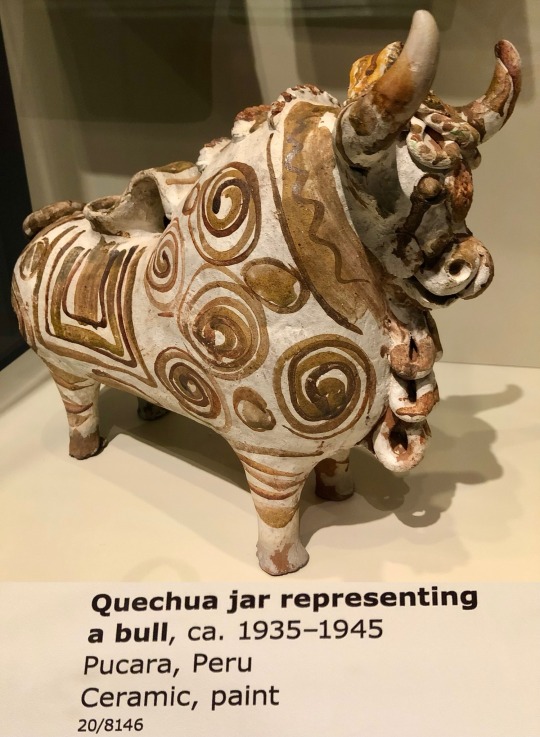
Quechua jar representing a bull, c. 1935-1945
Pucará, Peru
Pottery, clay slip, glaze, paint
33.00 x 11.50 x 27.50 cm
Smithsonian NMAI 20/8146
Records on similar pieces in the collection note they demonstrate how Inca llama ritual iconography was transferred onto the Spanish bull.
#animals in art#20th century art#museum visit#effigy vessel#animal effigy#bull#Peruvian art#Andean art#South American art#Indigenous art#Quechua art#Smithsonian NMAI#1930s#1940s#pottery#ceramics#polychrome#livestock#animal iconography
162 notes
·
View notes
Text

"Human figurine in terra cotta." Antiguo Peru : primera epoca. 1929.
Internet Archive
205 notes
·
View notes
Text

a young Lakota woman on the Pine Ridge reservation in South Dakota, 1972
#1972#retro beauty#70s fashion#photography#oglala#lakota#indigenous#south dakota#indigenous american
901 notes
·
View notes
Text
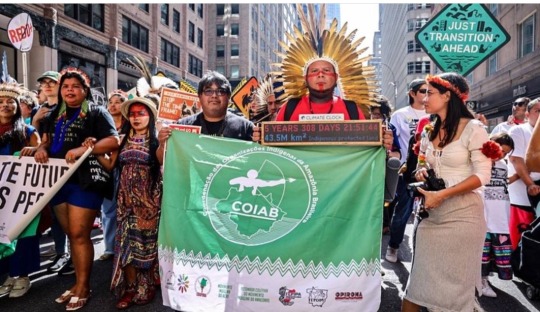
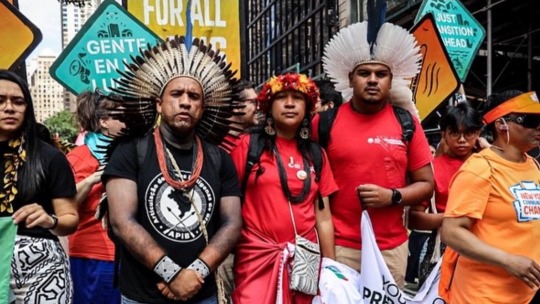
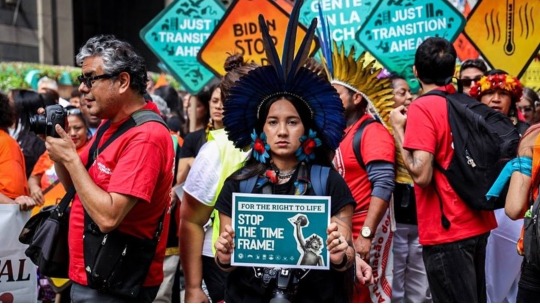
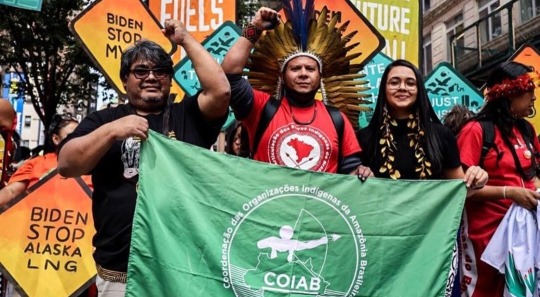
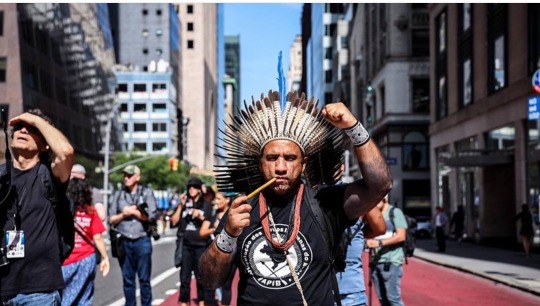
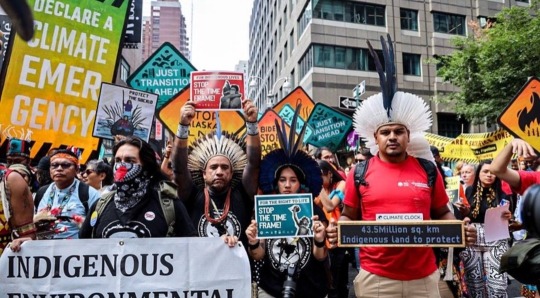
"Trial scheduled for September 20th at the Supreme Federal Court may determine the future of Indigenous Lands in Brazilian territory and be crucial for the global climate. The indigenous movement is mobilizing across Brazil, and an indigenous delegation from Apib is in New York during Climate Week to strengthen the international mobilization campaign in defense of Indigenous Lands rights."
"We are on the land, and the land is within us. If the land dies, we as indigenous peoples die."
The Articulação dos Povos Indígenas do Brasil (Articulation of Indigenous Peoples of Brazil — APIB) is calling for nationwide mobilizations this week and participating in the New York Climate Week to alert the world to the risks of the Supreme Federal Court (STF) judgment scheduled for September 20th. The court will vote on the legitimacy of the legal concept known as the "Temporal Framework," advocated by the Brazilian agribusiness, which could reevaluate Indigenous Land demarcations and impact global climate crisis mitigation efforts.
The Temporal Framework suggests that only indigenous people who can prove they were living on the land in 1988, the same year the Federal Constitution was created, should have rights to the land. This disregards the forced displacements of hundreds of indigenous groups who could only reclaim their traditional lands after Brazil's redemocratization in the late 1980s.
This week, the 15th edition of Climate Week is taking place in New York from September 17th to 24th, alongside the 78th Session of the United Nations General Assembly from September 19th to 23rd, which will feature a speech by President Lula during its opening. A delegation of 10 indigenous leaders is in New York to participate in Climate Week's activities. The international mobilization's goal is to emphasize to the world that the Temporal Framework is a threat to the lives of Brazil's indigenous peoples and could exacerbate the climate crisis, as Indigenous Lands serve as a reservoir of life on the planet.
Apib and its regional organizations are reinforcing mobilizations in territories, cities, and Brasília against the Temporal Framework on September 20th. The goal is to monitor the trial and strengthen the next steps of the indigenous movement's fight. The organizations within Apib mobilized over 220 protests in 21 states, including the Federal District, between May and June.
Five Supreme Federal Court (STF) justices are yet to vote in the trial. The current tally stands at four votes against the Temporal Framework thesis and two in favor. Justices Edson Fachin, Alexandre de Moraes, Cristiano Zanin, and Luís Roberto Barroso have expressed opposition to the agribusiness-backed thesis, while the only favorable votes came from justices appointed by former President Jair Bolsonaro, André Mendonça, and Nunes Marques.
On the same day as the STF vote, the Brazilian Senate attempts to put the Temporal Framework into law. The ruralist caucus in Congress seeks to create tension with the Brazilian judiciary since there is a possibility that the STF may invalidate the Temporal Framework thesis.
In addition to the Temporal Framework, Bill 2903 proposes other setbacks to the rights of indigenous peoples, such as the construction of highways and hydroelectric plants in indigenous territories without free, prior, and informed consent from affected communities. The proposal also aims to allow farmers to enter production contracts with indigenous people, violating the rights of indigenous peoples to the exclusive use of demarcated territories.
While some falsely claim that "there is too much land for too few indigenous people in Brazil," Apib counters that there is too much land for too few farmers and that agribusiness promotes the illegal invasion of indigenous lands. The entity asserts,
"There is no solution to the climate crisis without guaranteeing the rights of indigenous peoples and the demarcation of their territories."
Currently, nearly half of Brazil's land is in the hands of rural producers. Of the total land in the country, 41% corresponds to rural properties, 13.7% to indigenous lands, and 45.2% to other purposes, according to data published in the Official Gazette of the Union. Indigenous Lands are a guarantee of life for indigenous peoples and for all of humanity, which depends on the climate's future.
"As worsening climate crisis unfolds, many will be marked in history as accomplices to the new colonialism threatening the survival of us, indigenous peoples who inhabit the vast territory known as Brazil, and the future of all humanity because there is no solution to the climate crisis without the involvement of indigenous peoples," emphasizes Dinamam Tuxá.
Key activities of Apib during the 15th edition of Climate Week from September 17th to 24th:
On September 17th, Apib participated in the Climate Week march through the streets of New York in support of the Fight Fossil Fuel Strike. The indigenous delegation from Apib denounced the threat posed by the Temporal Framework thesis, highlighted the indigenous emergency situation concerning extractive industries and agribusiness that lead to multiple instances of violence in our territories. Additionally, as part of the Climate Week agenda, it's worth noting that Apib's executive coordinators Kleber Karipuna, Dinamam Tuxá, and other members of the indigenous delegation will participate in a talk on September 19th titled "FCLP: Rights, Participation, and Benefits for Indigenous Peoples and Local Communities in Forest Climate Financing," organized by the Forest and Climate Leaders Partnership. On September 22nd, a portion of the delegation will be present at a dialogue co-organized with H.E Razan Al Mubarak, the current president of the International Union for Conservation of Nature, to assess progress in the COP28 agenda with the aim of collectively identifying meaningful and respectful ways for Indigenous Peoples to engage in the COP.
About APIB
The Articulation of Indigenous Peoples of Brazil (Apib) is a nationally recognized entity within the indigenous movement in Brazil, created from the grassroots up. It brings together seven regional indigenous organizations (Apoinme, ArpinSudeste, ArpinSul, Aty Guasu, Conselho Terena, Coaib, and Comissão Guarani Yvyrupa) and was founded with the purpose of strengthening the unity of our peoples, fostering coordination among different regions and indigenous organizations across the country, as well as mobilizing indigenous peoples and organizations against threats and infringements on indigenous rights.
Support/donate to APIB
APIB Instagram page
APIB Website
#yara.txt#brasil#brazil#latin america#america latina#south america#brazilian politics#brazilian indigenous people#indigenous people#indigenous#native american#native women#first nations#ndn#ndn tag#ndn tumblr#latinoamerica#environmentalism#climate crisis#climate emergency#nature#naturism#naturist#anti capitalism#capitalism#anti colonialism#anti colonization#colonialism#colonization#neocolonialism
188 notes
·
View notes
Text
something about the tiktok ban that i haven't really seen people here talking about is the experience of tiktok users not from the usa, which was, as far as i can tell, on the whole, very positive. it was actually really nice to, for a short period of time, be on a major social media network and able to interact with people across the world without usamericans constantly inserting themselves into every conversation.
usamericans kind of take over people's fyp regardless of where you're from. this is partly to do with the fact that the creators fund is only available to usamericans so most of the shitty content farms are from the us. then there's also the cultural aspect of the fact that being a citizen of the most powerful empire in the world is a significant privilege, and also a privilege that 99% of usamericans are seemingly unable to acknowledge, plus the us centrism and exceptionalism, plus the constant need to cast themselves as the underdog, and, well. it's annoying.
so, like. everything of what i've seen (which is not to say that other opinions don't exist, just that i haven't seen them) is that it was really nice when the usamericans were gone, and it kind of sucks that they're back.
#tiktok ban#<- for those who are (very justifiably) sick of hearing about this#anyway also important to note that 99% of what ive seen has been from europeans canadians and australians#and i can guess that for people from asian african and south american countries it was probably just their feed being taken over by#other annoying english speakers rather than usamericans#and the 'commonwealth tiktok' thing (especially the fact that its referring to specifically uk canada and australia#and NO OTHER COMMONWEALTH COUNTRIES)#is uh. not great!#so im not saying like. magical utopia where everyone was equal#but im just saying that. idk there is no global major social media that isn't overrun with usamericans#and for about a day there was#anyway would be cool to hear from other non-usamericans!#especially if you're not european nor from from a european settler state#question is there a specific word/phrase that would include the citizens of countries like the usa/canada/australia/etc#but not the indigenous people of those places?#and no just saying white doesnt work because in those countries non-indigenous minority ethnic groups are still there under#the authority of a colonial government#and also im talking about privilege along the axis of nationality here as opposed to race/ethnicity#and the question of nationality gets complicated when we're talking about specifically the indigenous people of#an area currently controlled by a settled colonial state#ALSO also in regards to the fact that the whole thing was a trump propaganda stunt#and that there's now censorship of things trump doesnt like#its yet another example of how everyone else in the world gets directly affected by us politics#despite the fact that in this case the social media isnt even a us company#and not to say that it doesnt also suck for usamericans#many of whom voted for harris#but also. at least you got a vote.#the rest of us just have to live with the fact that whoever you guys elect will have a direct impact on our lives#and usamericans just don't experience this. like e.g. british elections have no impact on your lives#but your elections have a massive impact on our lives (and even worse for countries in the global south)
15 notes
·
View notes